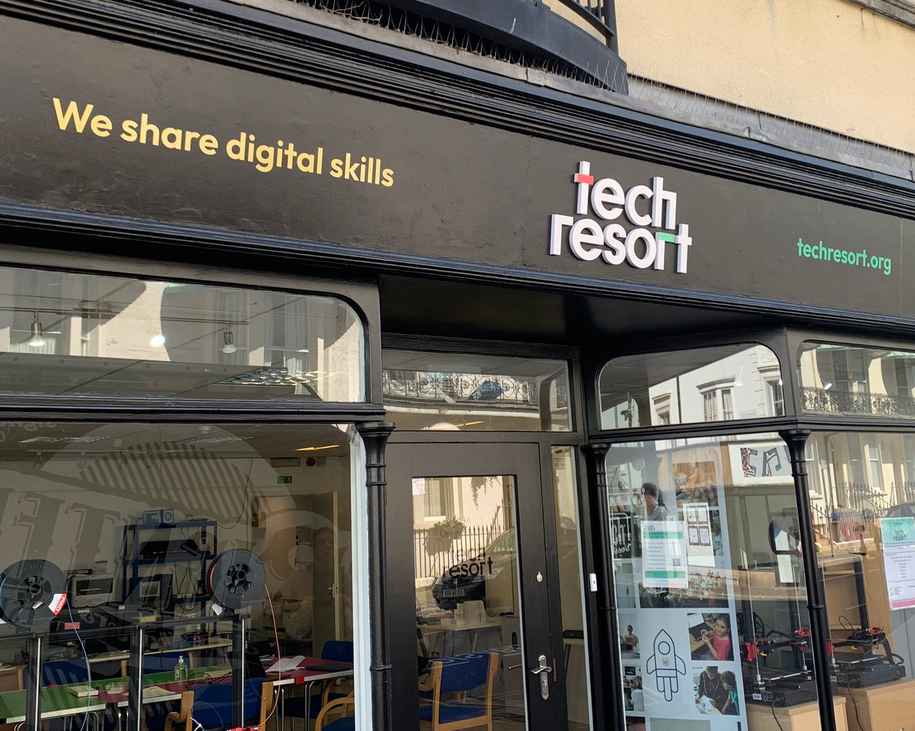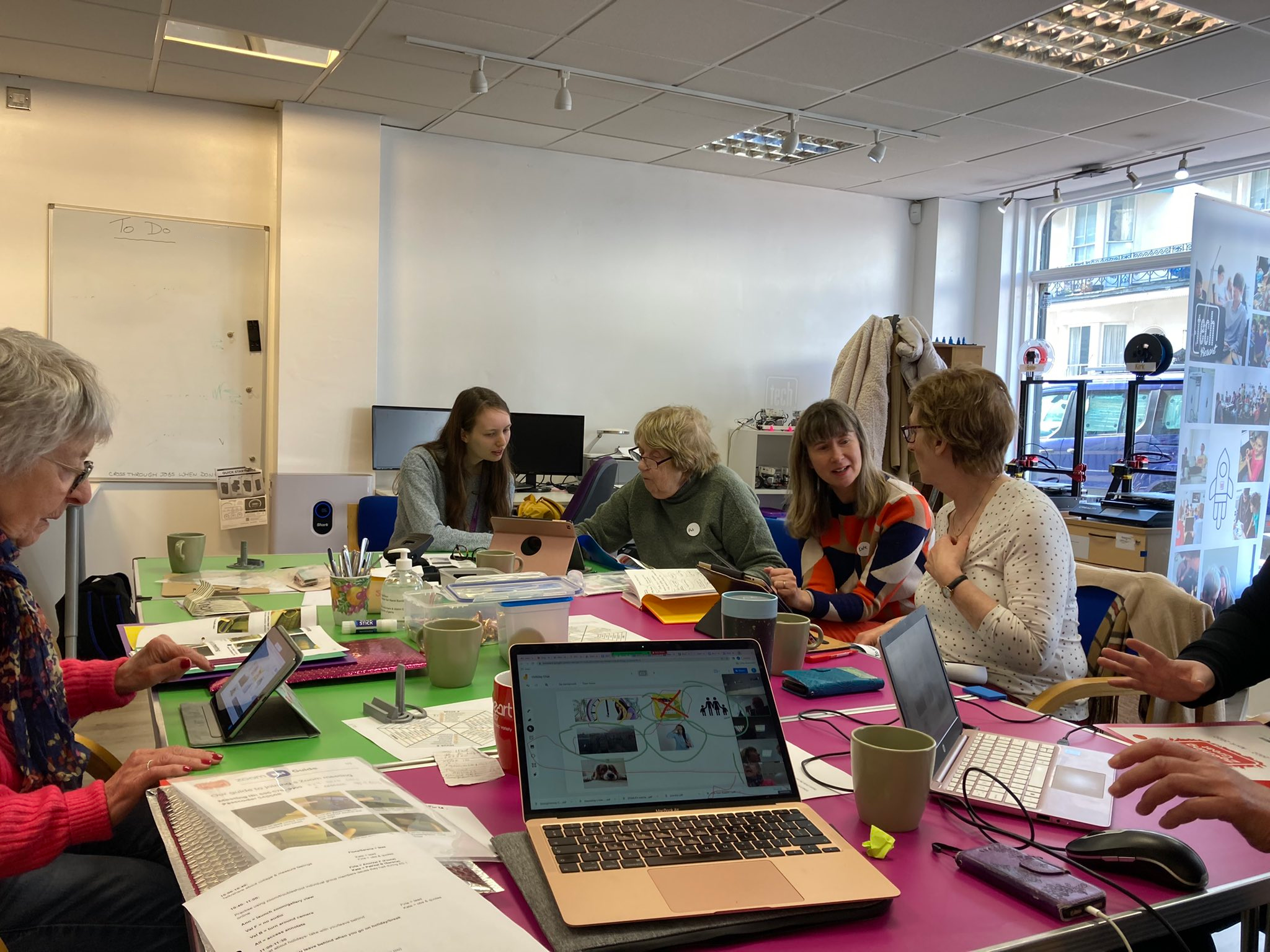Since moving in to our new base, minutes away from Eastbourne’s town centre, we’ve become more closely connected with our local community, and have started to build up a picture of the challenges it faces. We’ve been spending more of our time than ever tackling digital exclusion.
Over the last eight months alone, we’ve helped over 200 people improve their digital skills. Here’s a round-up of our digital inclusion activities this year.
Device donations
One of our main activities is refurbishing devices that have been kindly donated to us, making them ready for basic use. Then, once they are ready, we pass them on to members of our community who have no, or limited, digital access.
Digital access is no longer a “nice-to-have”, it’s an absolute essential for everyday life. Many of us take using a phone for granted, but without one, the world becomes a much harder place to navigate. Staying in touch with friends and family, job searching, and accessing essential services such as the NHS app or Universal Credit website becomes difficult or impossible without a device.
We regularly take referrals from local partner organisations such as the Foodbank, Citizens Advice, Salvation Army, Age UK, and Sanctuary, so that we can help their clients from all corners of society. While we’re helping as much as we are able to, we now have a waiting list in place and are in need of more devices. As the cost of living crisis continues, the need is not going away any time soon.
Since March 2020, we have been receiving devices kindly donated by members of the public and businesses up and down the country, including phones, laptops, and tablets.
Our team of young workers then:
- wipe any remaining data
- check it works and is suitable for basic use
- upgrade the hardware, if necessary
- install fresh software ready for use
- place it in a new bag with accessories and instructions on getting started
We’re also a partner in the Good Things Foundation’s National Databank. They’ve encouraged mobile networks (Virgin Media, O2, Vodafone and Three) to donate SIM cards to organisations such as ours, so we can share them with people who’re digitally excluded. We’ve given out over 70 SIM cards this year.
Donation enables people who have no access at all to get online, in some cases for the very first time. We regularly get feedback saying how much of a positive, “life-changing” difference it makes.
Drop-in digital skills help
Access is often the first hurdle to getting online, but online confidence is another.
Since April, we’ve opened our doors for public drop-in sessions. Anyone can come in and ask for help, or book a further appointment.
We’ve found that patient and friendly 1:1 coaching is the most impactful way of teaching digital skills. Formal qualifications or certificates in “digital skills” aren’t something we offer, but our format allows everyone to tick off the most important job on their list, and then progress their learning at their own pace.
We’ve also run drop-in sessions out in the community this year at venues including Leaf Hall, Citizens Advice in St Leonards, Age Concern in Eastbourne, Langney Community Library and Old Town Community Library. Thank you to all for being fantastic hosts, and for letting us share digital skills further afield.
Here are just three examples of how we’ve helped people at drop-ins this year. We’ve changed people’s names below to respect their privacy.
Lynn came in to our office as she happened to be walking past. She was recently the victim of a bank scam call, and so had become very hesitant about the potential risks of carrying out financial transactions online, and using the internet in general. This led her to install multiple pieces of antivirus software on her computer. These were giving misleading pop-ups about needing to carry out additional purchases to stay safe, and were slowing her computer down. We booked a 1:1 appointment so we could give Lynn some reassurance and tips for staying safe online, set up two-factor authentication on her accounts, and helped speed her computer up.
Sophie was referred to us by a local partner organisation. She was looking for work, and was using her tablet to write a CV and send it off to potential employers. As she had been, until recently, employed with one organisation for over twenty years, doing this activity online was completely new to her. We talked about managing files on a tablet, and guided her through saving files so she could find them again in order to attach them to an email, or upload them to job searching websites. This made an essential online task much easier for her, and gave her a lot more confidence to continue searching for work herself.
Fernando had recently gained his refugee status in the country, and was looking to learn Microsoft Excel to help boost his digital confidence and work skills. He worked 1:1 with one of our young members of staff through some spreadsheet exercises. The informal and patient coaching style we offered benefitted him, and he came back several times to keep learning more. Our young member of staff also learnt a lot about Excel in the process of helping someone else!
All these different case studies show that digital exclusion is not one “thing” that can be tackled with a quick “one-size fits all” solution – it presents itself in many different ways, and often with many different factors multiplying on top to make accessing help even harder. For example, a number of our clients are neurodiverse, or have limited English. Our fantastic team ensures everyone feels welcome and are able to take small steps towards improving their digital capabilities.
Digital skills for speech therapy
We were approached by a charity called Say Aphasia, who were working on a project aiming to reduce the sense of isolation people with aphasia felt. One of the ways suggested was to hold virtual meetings on Zoom, so people with the condition could talk together and take part in art-themed activities.
However, getting started on Zoom requires several small steps which are an immediate obstacle to taking part. With a brain injury, it is significantly harder to process text on screen. With the support of our staff, the group started to build confidence and we took things at a gentle pace, keeping the sessions sociable and informal.
It was delightful seeing everyone’s skills grow week-on-week, and to see the group bond. It has really highlighted the impact digital exclusion has and how dedicated skills sharing sessions can have huge benefits. Having devices and connectivity are just part of the issue of exclusion – having skills and motivation to progress is another equally important part, and each group will require slightly different help.
Coding with mums and girls
‘Digital inclusion’ isn’t just about getting people online or essential skills – it’s also about including everyone in more advanced digital activities such as coding.
Women are vastly under represented in creative and digital organisations, and girls are under represented in higher level computer science courses. We’d love to see more girls come to our sessions for young people, too!
When the East Sussex County Council Library Service asked us to run some workshops specifically for women and girls to coincide with Women’s History Month, we were keen to help.
We designed a “Coding for Mums” session for women who wanted to engage with what their children are learning in their computer classes at school, so they can take an interest and are better able to help at home. The session started with learning about key principles of algorithms (such as decomposition and specificity), and then creating an algorithm using post-it notes. This visual learning tool is terrific, as you can also easily see the effect of moving the instructions (‘code’) around.
Then, we moved on to coding platforms such as Scratch and Hour of Code – they’re both brilliant free resources that we use in our sessions, many schools use, and that can be accessed from home to continue learning.
And plenty more!
We’ve also continued to contribute content and technical support for the Digital Inclusion Toolkit. This growing resource provides advice and case studies for local councils to help guide their digital inclusion efforts in their area.
In July, we attended Eastbourne’s Cost of Living Emergency Summit alongside twenty other local partner organisations, to share ideas and show how digital inclusion can play a vital role in helping people in our community.
We’ve also helped local community groups with their digital infrastructure – be it troublesome WiFi access points, setting up new devices, or email and website hosting – so that they can continue their vital work without the headache of digital barriers.
Read more of our thoughts on Eastbourne’s digital needs
Earlier this year, we wrote a five-part blog series examining the digital needs of seaside towns like ours.
Over our nine years of operation, and particularly this past year in our new base, we’ve seen first-hand how digital needs are changing and how positive intervention such as our device donations, drop-ins and sessions have benefits for the community.
We’re expecting to update and add to this series in 2023. We’d love to hear what you think.
Can you help us?
We pride ourselves on keeping all of our sessions and drop-ins entirely free to access, so that we can help as many people as possible.
If you are able to donate financially to support us, we would be incredibly grateful. You can donate online via our localgiving page.
If you have any phones, tablets, or laptops you no longer need, we would love to be able to stop them going to e-waste or gathering dust when they could help out members of our community with no access. Please consider donating them to us – please fill out the online donation form, or drop them in to our office.
You can also help us by spreading the word about us online – follow us on Instagram, Twitter and Facebook for updates on our work!
Thank you for reading, and here’s to helping more people in 2023!


